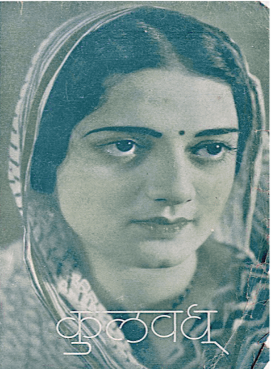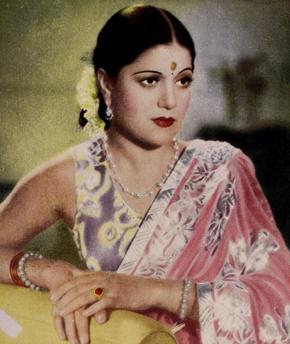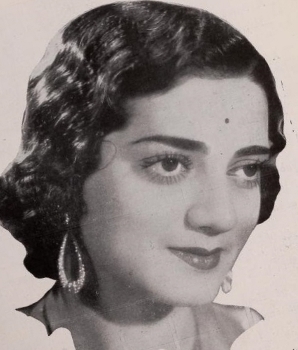Related Research Articles

Chandrahasa is a king of the Kuntala kingdom in Hindu mythology. The story of Chandrahasa is described in the Ashvamedhika Parva of the epic Mahabharata. Chandrahasa befriends Arjuna who was accompanied by Krishna guarding the ashvamedha ceremony of Yudhishthira. Chandrahasa anoints his son Makaraksha as the king and accompanies the army of Arjuna to help the ashvamedha.
Chandrahasan is a 1936 Tamil-language film directed by Bengali filmmaker Profulla Ghosh. The film star Master V. N. Sundaram, P. B. Rangachari, M. R. Santhanalakshmi, P. C. Seetharaman, C. S. Saradambal, J. Susheela Devi, M. R. Subramania Mudaliar, K. S. Subramania Iyer, S. Kalyanasundaram Iyer, D. Sundaram Iyer, Master Ramudu, Miss Rajam and P. Ramaiah Sastrigal.
Musafir is a 1940 social Hindi language film directed by Chaturbhuj Doshi. Produced by Ranjit Studios, the music was by Gyan Dutt and it starred Noor Mohammed Charlie, Khursheed, Ishwarlal and Yakub.

Noor Mohammed Charlie, popularly known as Charlie, was an Indian/ Pakistani actor born in 1911 in Ranavav village, Porbandar, Saurashtra, British India. Best known for his comedy roles, he was the first 'star' comedian and has been referred to as India's first comedy king. He acted with several top actresses of the day as a comic hero. Being a great fan of Charlie Chaplin, he took "Charlie" as his screen name following the release of his popular film The Indian Charlie (1933). He had a successful career in pre-partition India from 1925–1946. His shift to Pakistan following partition saw his career going down with less than 12 films. He shifted to the US to live with his son and returned later to Pakistan where he died in 1983.
Rajrani Meera is a 1933 Hindi devotional film. It was directed by Debaki Bose for New Theatres Ltd. Calcutta. The cinematographer was Nitin Bose with music composed by R. C. Boral. The film was a bilingual, made in Bengali as Meerabai and directed by Hiren Bose and Basanta Chatterjee. The film starred Durga Khote, Prithviraj Kapoor, K. L. Saigal, Pahari Sanyal, Molina Devi and Indubala. K. L. Saigal had a small part that of a devotee in the film with Prithviraj Kapoor playing the male protagonist role. The film made Prithviraj Kapoor who played the role of the King of Mewar, Mirabai's husband, a big star and is cited as one of his career's best films.
Sarvottam Badami (1910–2005) was an Indian film director of Hindi, Telugu, and Tamil films. He started his career as a sound recordist for the first talkie in India, Alam Ara (1931). In 1948 he helped set up the Films Division for news-reel and documentaries, where he worked as the chief producer in the newsreel department and also made documentaries. His active years were from 1932 to 1952 when he retired from the Films Division and from making feature films to settle in Bangalore.
Grihalakshmi is a 1934 Hindi social family melodrama film directed by Sarvottam Badami with story by Dr. Jayant Shyam and cinematography by Faredoon Irani. The film was produced by Sagar Movietone and had music by S. P. Rane. The cast included Sabita Devi, Jal Merchant, Yakub, Kamala Devi, K. C. Dey, Swaroop Rani and Asooji.
Vengeance is Mine also called Vair Ka Badla is a 1935 social Hindi film directed by Sarvottam Badami based on K. M. Munshi's story. After directing three regional language films for Sagar Movietone, Badami was now directing films exclusively in Hindi. After the first Hindi film he directed Chandrahasa (1933), he shifted his focus to socially relevant topics and made two films based on Munshi's stories, Vengeance is Mine (1935) and Dr. Madhurika (1935). Vengeance is Mine was made on a story Munshi had written in Gujarati language as "Ver Ni Vasulat" in 1913 under the nom de plume "Ghanshyam". The cast included Kumar, Sabita Devi, Yakub, Sitara Devi, Padma Devi and Mehboob Khan.

Kulvadhu (transl. Daughter-in-Law) is a 1937 Indian Hindi-language social family drama film directed by Sarvottam Badami. Made under the Sagar Movietone banner it had music by Pransukh M Nayak, and the film starred Motilal, Sabita Devi, Gulzar and Pesi Patel.
Kokila (transl. Nightingale) is a 1937 Hindi social family drama film directed by Sarvottam Badami. The music was composed by Anil Biswas with lyrics written by Siddiqui and Zia Sarhadi. The story was adapted from the well-known novel Kokila, written by Gujarati writer Ramanlal Vasantlal Desai. The film starred Motilal, Sabita Devi, Shobhna Samarth, Maya Bannerjee, Sitara Devi, Pesi Patel, Siddiqui and Kayam Ali.
Ladies Only is a 1939 Indian Hindi-language social comedy film directed by Sarvottam Badami. Produced by Sagar Movietone, it had music by Anupam Ghatak and starred Surendranath, Sabita Devi, Bibbo and Prabha. This was the last comedy film made by Sarvottam Badami before he left Sagar Movietone. He joined his mentor Ambalal Patel, at Sudama Pictures to start making "socially relevant" films.
Chingari (transl. Embers) is a 1940 social Hindi film directed by Sarvottam Badami. Made under the banner of Sudama Productions, the film had music by Gyan Dutt. Prithviraj Kapoor shifted from New Theatres Ltd. Calcutta to Bombay, where he worked under Badami in two films, Sajani and Chingari both made in 1940. The cast included Prithviraj Kapoor, Sabita Devi, E. Billimoria, Meera, Khatoon and Keshavrao Date.
Khilona is a 1942 social Hindi film directed by Sarvottam Badami. The film was produced at Ranjit Studios by Amar Pictures. It had music by Khemchand Prakash with lyrics by Pandit Indra Chandra. Khilona was one of the major films which brought the actress Snehprabha Pradhan into prominence. The cast included Snehprabha Pradhan, P. Jairaj, Prabha, Satish, Kanhaiyalal and Pratima Devi.

Sardar Akhtar (1915–1986) was an Indian actress who worked in Hindi and Urdu films. She started her acting career on the Urdu stage. Her early films were with Saroj Movietone, where she did a majority of stunt (action) roles. She came into prominence as the washer-woman in the role of Rami Dhoban in Sohrab Modi's Pukar (1939). As a woman seeking justice for the death of her husband, it was a breakthrough role for her. A popular song she sang in the film was "Kaheko Mohe Chhede". Her career defining role was as a "peasant woman" deserted by her husband, in Mehboob Khan's Aurat (1940), a role later made famous by Nargis in Mehboob's remake Mother India.

Bibbo was a music composer, singer and actress who worked in both Indian and Pakistani films. She acted in Indian cinema from 1931 to 1947 before moving to Pakistan, following Partition of India in 1947. She started her acting career with Ajanta Cinetone Ltd. in 1933, working with directors like M. D. Bhavnani and A. P. Kapoor. She was one of the top leading ladies of the 1930s along with actresses like Devika Rani, Durga Khote, Sulochana, Mehtab, Shanta Apte, Sabita Devi, Leela Desai and Naseem Banu. She was referred to as "one of the most important female stars of the 1930s and 1940s". Her fame had her featured in the lyrics of a popular song from the film Gharib Ke Lal (1939) sung by Mirza Musharraf and Kamla Karnataki, with music by Sagheer Asif and lyrics by Rafi Kashmiri. "Tujhe Bibbo Kahoon Ke Sulochana", where Sulochana referred to another popular actress of the time. This was the first time a song featuring famous actors was used in the lyrics of a film song.

Sabita Devi (1914–1965) was a Hindi film actress in Indian cinema. She is stated to be one of the "prominent" leading ladies of the "pioneering era" of Indian cinema along with Mehtab, Bibbo, Durga Khote, Gohar, Devika Rani and Seeta Devi. A Jewish by birth, she changed her name to find acceptability in Hindi cinema like the other Anglo-Indian and Jewish actresses of her time, Sulochana, Seeta Devi, Madhuri, and Manorama. After initially working with British Dominion Films Ltd., Calcutta, she shifted to Bombay and performed mainly in films produced by Sagar Movietone with her co-star in most films being Motilal. Some of the popular films with Motilal were Dr. Madhurika (1935) and Kulvadhu (1937) directed by Sarvottam Badami. Their first film together was Shaher Ka Jadoo (1934), which was also Motilal's debut film, and then Lagna Bandhan (1936) both directed by Kaliprasad Ghosh. She acted in Silver King (1935) with Motilal. It was an action film directed by C. M. Luhar, which became a "huge success".

Sagar Movietone also Sagar Films, Sagar Film Company and Sagar Productions was an Indian film production company involved in the making of films for Indian cinema. It was launched by Ardeshir Irani with Chimanlal Desai and Dr. Ambalal Patel in 1929 in Bombay, Maharashtra, India. Sagar was initially started as a branch company of Ardeshir's Imperial Film Company. Several key figures from Imperial, such as Mehboob Khan were shifted to Sagar. The studio was in operation from 1930 to 1939. In 1940, it combined with General Pictures to form National Studios. It made "Parsi theatre based films, mythologicals and stunt movies". Sagar fostered the career of many artists who rose to prominence. Early directors such as Prafulla Ghosh, Sarvottam Badami, Ezra Mir and Nanubhai Vakil were promoted by the company. Mehboob Khan got his first break as a director in Al Hilal in 1935. He was referred to as "the most important alumnus" from Sagar, who went on to become one of Indian cinema's "most influential film-makers".

Bhudo Advani was an Indian character actor and comedian. He started his acting career in theatre with the notion of spreading awareness on social issues. He came to Bombay on the advice of an Ajanta Cinetone representative and was offered a role in the film Afzal, also called Hoor-E-Haram in 1933, directed by Mohan Bhavnani. He later joined Sagar Movietone, becoming an important fixture in most films produced by them. He turned from character roles to comedy performing in Dr. Madhurika (1935), directed by Sarvottam Badami, Deccan Queen (1936) and Do Diwaane (1936), by C. Luhar.
References
- ↑ Ashish Rajadhyaksha; Paul Willemen (10 July 2014). Encyclopedia of Indian Cinema. Taylor & Francis. pp. 2–. ISBN 978-1-135-94325-7 . Retrieved 30 September 2014.
- ↑ Gita Vittal (1 January 2007). Reflections: Experiences of a Bureaucrat's Wife. Academic Foundation. pp. 73–. ISBN 978-81-7188-471-1 . Retrieved 30 September 2014.
- 1 2 3 Guy, Randor (28 August 2011). "Chandrahasan 1936". The Hindu. Retrieved 20 March 2020.
- ↑ "Chandrahasa". Gomolo.com. Retrieved 30 September 2014.
- ↑ "Chandrahasa 1933". Aln Goble. Retrieved 30 September 2014.
- ↑ Sanjit Narwekar (1 January 2005). Eena Meena Deeka: The Story of Hindi Film Comedy. Rupa & Company. p. 53. ISBN 978-81-291-0859-3 . Retrieved 30 September 2014.
- ↑ "Search Chandrahasa". Gomolo.com. Retrieved 30 September 2014.
- ↑ "Chandrahasa 1933". Muvyz, Inc. Retrieved 30 September 2014.